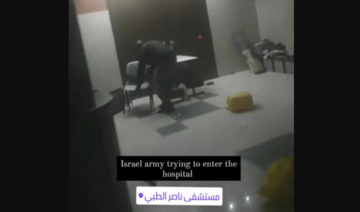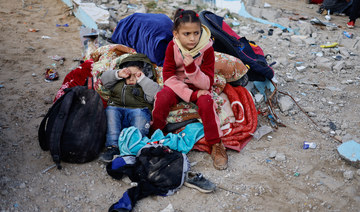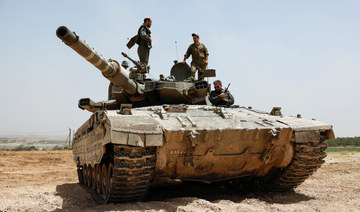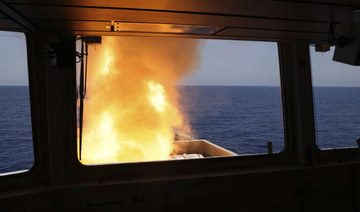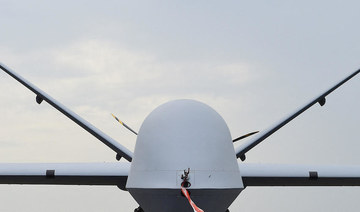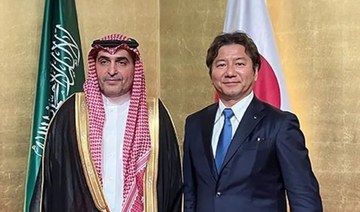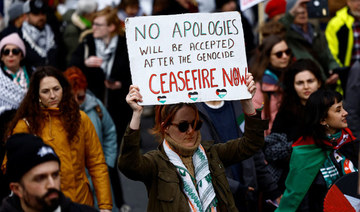GAZA STRIP, Palestinian Territories: Israel said it had taken 100 people into custody at one of Gaza’s main hospitals Saturday after troops raided the facility, with fears mounting for patients and staff trapped inside.
The deadly bombardment of Gaza continued overnight with another 100 people killed in Israeli strikes, according to the Hamas-run health ministry.
At least 120 patients and five medical teams are stuck without water, food and electricity in the Nasser hospital in Gaza’s main southern city of Khan Yunis, according to the health ministry.
Israel has for weeks concentrated its military operations in Khan Yunis, the hometown of Hamas’s Gaza leader Yahya Sinwar, the alleged architect of the October 7 attack that triggered the war.
Intense fighting has raged around the Nasser hospital — one of the Palestinian territory’s last major medical facilities that remains even partly operational.
The power was cut and the generators stopped after the raid, leading to the deaths of six patients due to a lack of oxygen, according to Gaza’s health ministry.
“New-born children are at a risk of dying in the next few hours,” the ministry warned Saturday.
Israel’s army said troops entered the hospital on Thursday, acting on what it said was “credible intelligence” that hostages seized in the October 7 attack had been held there and that the bodies of some may still be inside.
It said it has detained 100 people from the hospital suspected of “terrorist activity,” seized weapons and retrieved “medications with the names of Israeli hostages” in the hospital.
But the raid has been criticized by medics and the United Nations. The army has insisted it made every effort to keep the hospital supplied with power, including bringing in an alternative generator.
A witness, who declined to be named for safety reasons, told AFP the Israeli forces had shot “at anyone who moved inside the hospital.”
World Health Organization spokesperson Tarik Jasarevic slammed the operation Friday, saying “more degradation to the hospital means more lives being lost.”
“Patients, health workers, and civilians who are seeking refuge in hospitals deserve safety and not a burial in those places of healing,” he said.
Doctors Without Borders said its medics had been forced to flee and leave patients behind, with one employee unaccounted for and another detained by Israeli forces.
The Gaza war began with Hamas’ October 7 attack which resulted in the deaths of about 1,160 people in Israel, mostly civilians, according to an AFP tally based on official Israeli figures.
Militants also took about 250 people hostage, 130 of whom are still in Gaza, including 30 who are presumed dead, according to Israeli figures.
Israel’s subsequent assault on Gaza has killed at least 28,858 people, mostly women and children, according to the territory’s health ministry.
Israel has repeatedly accused Hamas of using hospitals for military purposes, which the Palestinian Islamist group has denied.
The UN Human Rights Office said the Nasser hospital raid appeared to be “part of a pattern of attacks by Israeli forces striking essential life-saving civilian infrastructure.”
High-level negotiations to pause the war were held this week in Cairo, but their outcome is still unclear.
A day after US President Joe Biden called for a “temporary truce” to secure the release of hostages, Hamas chief Ismail Haniyeh on Saturday reiterated the group’s demands, including a complete pause in fighting, the release of Hamas prisoners, and withdrawal of Israeli troops.
Qatar-based Haniyeh said Hamas would “not agree to anything less.”
Biden has also urged Israeli Prime Minister Benjamin Netanyahu not to launch an offensive in Rafah without a plan to keep civilians safe — but Netanyahu insisted he would push ahead with a “powerful” operation there to defeat Hamas.
Around 1.4 million displaced civilians are trapped in Rafah after taking refuge in a makeshift encampment by the Egyptian border, with dwindling supplies.
“We are dying slowly due to the scarcity of resources and the lack of medications and treatments,” said displaced Palestinian Mohammad Yaghi.
In northern Gaza, many are so desperate for food they are grinding up animal feed.
“We need food now,” said Mohammed Nassar, 50, from Jabalia in northern Gaza.
“We’re going to die from hunger, not by bombs or missiles.”
With the UN warning that Gazans are close to famine, the head of its agency for Palestinian refugees accused Israel of waging a campaign to “destroy” it entirely.
Israel has called for UNRWA chief Philippe Lazzarini to resign following claims a Hamas tunnel was discovered under its Gaza City headquarters.
Lazzarini told Swiss media Tamedia that the tunnel was 20 meters underground, and UNRWA didn’t have the capabilities to search below ground in Gaza. More than 150 UNRWA installations have been hit during the war, he said.
Hamas’s armed wing has warned hostages in Gaza are also “struggling to stay alive” as conditions deteriorate due to relentless Israeli bombardments.
The Wall Street Journal reported this week that Egypt was building a walled camp near the border to accommodate Palestinians displaced from Gaza, citing Egyptian officials and security analysts.
Satellite images obtained by AFP show machinery building a wall along the highly secure frontier.
In a southern Israeli town about 25 kilometers (15 miles) north of Gaza, a gunman killed two people at a crowded bus stop on Friday, as Netanyahu warned the entire country had become a front line of war.
With the conflict now in its fifth month, regional tensions remain high.
Hamas ally Hezbollah and arch-foe Israel have been exchanging near-daily border fire since the start of the Israel-Hamas war.
The leader of the Iran-backed Hezbollah movement, Hassan Nasrallah, vowed that Israel would pay “with blood” for civilians it has killed in Lebanon.
Fresh Gaza strikes as fears grow for patients in raided hospital
https://arab.news/j6ygm
Fresh Gaza strikes as fears grow for patients in raided hospital
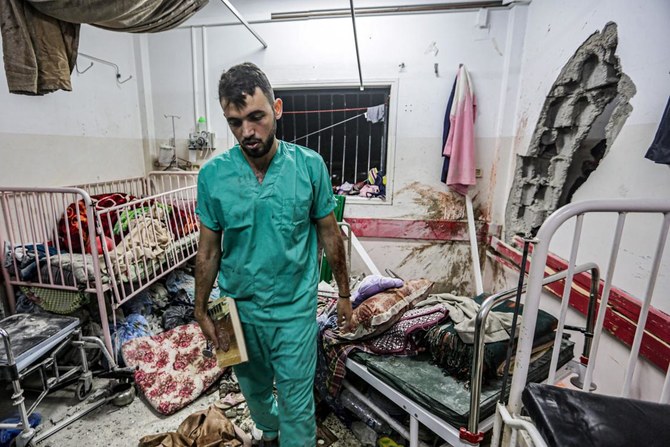
- The deadly bombardment of Gaza continued overnight with another 100 people killed in Israeli strikes
- At least 120 patients and five medical teams are stuck without water, food and electricity in the Nasser hospital in Khan Yunis
Top UN court says to rule Friday on South Africa Gaza ceasefire bid
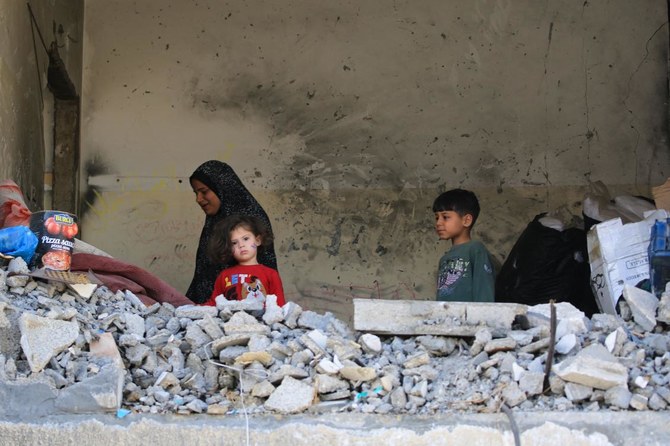
South Africa has petitioned the International Court of Justice for emergency measures to order Israel to “cease its military operations in the Gaza Strip” including in Rafah city, where it is pressing an offensive.
The rulings of the ICJ, which rules on disputes between states, are binding but it has no power to enforce them — it has ordered Russia to halt its invasion of Ukraine to no avail, for example.
But a ruling against Israel would increase the international legal pressure after the International Criminal Court’s top prosecutor said Monday he was seeking arrest warrants for top Israeli and Hamas leaders.
In hearings last week, South Africa charged that what it described as Israel’s “genocide” in Gaza had hit a “new and horrific stage” with its assault on Rafah, the last part of Gaza to face a ground invasion.
The Rafah campaign is “the last step in the destruction of Gaza and its Palestinian people,” argued Vaughan Lowe, a lawyer for South Africa.
“It was Rafah that brought South Africa to the court. But it is all Palestinians as a national, ethnical and racial group who need the protection from genocide that the court can order,” he added.
Lawyers for Israel hit out at South Africa’s case as being “totally divorced” from reality that made a “mockery” of the 1948 UN Genocide Convention it is accused of breaching.
“Calling something a genocide again and again does not make it genocide. Repeating a lie does not make it true,” top lawyer for Israel Gilad Noam said.
“There is a tragic war going on but there is no genocide,” he added.
Israeli troops began their ground assault on parts of Rafah early this month, defying international opposition including from top ally the United States, which voiced fears for the more than one million civilians trapped in the city.
Israel has ordered mass evacuations from the city, where it has vowed to eliminate Hamas’s tunnel network and its remaining fighters.
The UN says more than 800,000 people have fled.
Israel says ready to resume truce talks as Gaza war grinds on
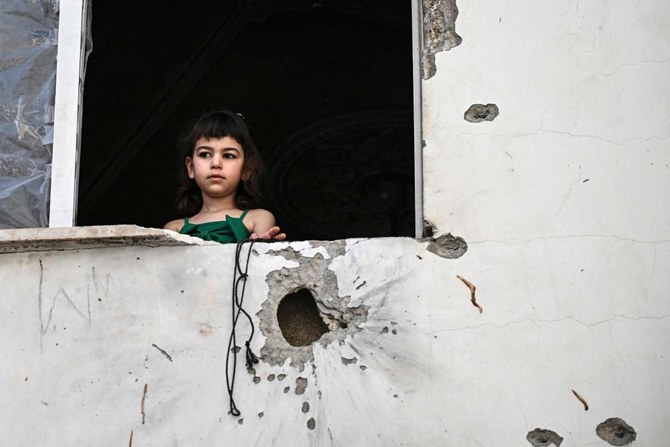
- The week started with the prosecutor at the International Criminal Court seeking arrest warrants over war crimes
- Newly released video showed five female Israeli soldiers, tied up and some with bloodied faces, in the hands of Palestinian militants
Jerusalem: Israel bombed Gaza on Thursday even as it said it was ready to resume stalled talks on a truce and hostage release deal with Hamas to pause the war raging since October 7.
Global pressure for a ceasefire has mounted on Israel and its Prime Minister Benjamin Netanyahu as three European countries said Wednesday they would recognize a Palestinian state.
The week started with the prosecutor at the International Criminal Court seeking arrest warrants over war crimes against Netanyahu and his defense minister as well as three Hamas leaders.
Israel has angrily rejected those moves, voicing “disgust” over the ICC move and labelling a recognition of the State of Palestine now a “reward for terrorism.”
But domestic pressure has also risen as supporters of hostages trapped in war-torn Gaza again rallied outside Netanyahu’s office, passionately demanding steps to free them.
A newly released video showed five female Israeli soldiers, tied up and some with bloodied faces, in the hands of Palestinian militants during the attack more than seven months ago.
The three-minute clip, taken from a militant’s body camera footage, was released by the Hostage and Missing Families Forum on Wednesday after the Israeli army lifted censorship on it.
“The footage reveals the violent, humiliating and traumatising treatment the girls endured on the day of their abduction, their eyes filled with raw terror,” the forum said.
Netanyahu vowed to continue fighting Hamas to “ensure what we have seen tonight never happens again,” and more bombardment rained down overnight on targets in the devastated Gaza Strip.
But his office also said that the war cabinet had asked the Israeli negotiating team “to continue negotiations for the return of the hostages.”
The previous round of truce talks, involving US, Egyptian and Qatari mediators, ended shortly after Israel launched its attack on Gaza’s far-southern city of Rafah early this month.
Israel went ahead with the assault on the last Gaza city so far spared a major ground offensive in defiance of global opposition, including from top ally the United States.
Washington voiced concerns that 1.4 million Palestinians who had been trapped in crowded tent cities and shelters there would be caught in the line of fire.
Israel has since ordered mass evacuations from the city, and the UN says more than 800,000 people have fled.
US President Joe Biden’s national security adviser, Jake Sullivan, said Wednesday the Rafah operation “has been more targeted and limited” than feared and “has not involved major military operations into the heart of dense urban areas.”
But he stopped short of saying that Israel had addressed US concerns, adding that Washington was closely watching ongoing Israeli actions.
Israel’s National Security Adviser Tzachi Hanegbi has meanwhile given a bleak assessment of the war so far to a meeting of the parliament’s foreign affairs and defense committee, according to a report by Israel’s Channel 13.
He reportedly said that Israel has “not achieved any of the strategic aims of the war — not conditions for a hostage deal, we haven’t toppled Hamas, and we haven’t allowed residents of the (Gaza) periphery to return safely home.”
The bloodiest ever Gaza war broke out after Hamas’s unprecedented attack on October 7 resulted in the deaths of more than 1,170 people, mostly civilians, according to an AFP tally of Israeli official figures.
Militants also took 252 hostages, 124 of whom remain in Gaza, including 37 the army says are dead.
Israel’s retaliatory offensive has killed at least 35,709 people in Gaza, mostly women and children, according to the Hamas-run territory’s health ministry.
Heavy fighting raged again in Gaza, where an AFP team reported fresh strikes early Thursday around Rafah.
Troops in the city had “dismantled a number of tunnel shafts and launchers in the area, and eliminated several terrorists during close-quarters encounters,” said the military.
Urban combat has also flared again in northern areas, including Jabalia, which Israeli forces first entered several months ago.
Israeli forces there “targeted several Hamas terrorists during strikes on military compounds” and located AK-47 and sniper rifles, grenades and other weaponry, the military said.
Israel has also imposed a siege that has deprived Gaza’s 2.4 million people of most drinking water, food, medical and fuel supplies.
The sporadic arrival of aid by truck slowed further after Israeli forces took control of the Rafah border crossing with Egypt.
Jordan and others have kept up aid airdrops, and relief goods have been shipped in via a US-built pier, but many trucks were quickly swarmed by desperate crowds.
Israel has faced ever greater opposition to the bloody war around the world, and pro-Palestinian protests have swept US and other university campuses.
Israel reacted with fury after Ireland, Norway and Spain said they would recognize a Palestinian state on May 28, a move praised by Palestinians and across the Arab world.
Israel recalled its envoys to Dublin, Oslo and Madrid and summoned their ambassadors for a rebuke.
Most Western governments say they are willing to recognize Palestinian statehood one day, but not before thorny issues such as final borders and the status of Jerusalem are settled.
The White House said Biden opposed unilateral recognition of a Palestinian state, saying it should be realized “through direct negotiations.”
Irish Prime Minister Simon Harris called the October 7 attack “barbaric” but stressed that “a two-state solution is the only way out of the generational cycles of violence.”
Vessel targeted by ‘missile’ attack off Yemen: security firms
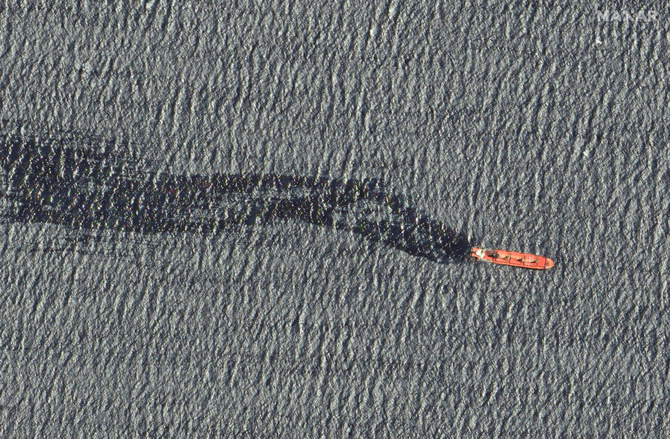
- The vessel was “suspiciously approached” 68 nautical miles (125 kilometers) off Hodeidah
- No injuries or damages reported
SANAA: A missile attack targeted a commercial vessel transiting southwest of Yemen’s port city of Hodeidah without causing any damage or casualties, maritime security firms said on Thursday.
The vessel was “suspiciously approached” 68 nautical miles (125 kilometers) off Hodeidah, Ambrey said, without identifying the ship or the flag that it was flying.
“The vessel had undergone what she described as a ‘missile attack’ at the location,” it added, noting that “no injuries or damages were reported.”
UKMTO WARNING INCIDENT 073 UPDATE 001https://t.co/6mNrG6WD8m#MaritimeSecurity #MarSec pic.twitter.com/t7mzh6HMO1
— United Kingdom Maritime Trade Operations (UKMTO) (@UK_MTO) May 23, 2024
The United Kingdom Maritime Trade Operations, run by the Royal Navy, also reported an incident at the same location, with “a missile impacting the water in close proximity” to the ship.
“Vessel and all crew are safe and proceeding to next port of call,” it said in an advisory.
There was no immediate claim of responsibility but Yemen’s Iran-backed Houthis have launched a flurry of attacks against ships since November.
The group, which controls the Yemeni capital Sanaa and much of the country’s Red Sea coast, say their campaign is in solidarity with Palestinians amid the Gaza war.
Their attacks have prompted US and British reprisal strikes and the formation of an international naval coalition to protect the vital trade route.
On Wednesday, US military forces shot down four drones in Houthi-controlled parts of Yemen, the US Central Command (CENTCOM) said.
“It was determined these systems presented an imminent threat to US coalition forces, and merchant vessels in the region,” CENTCOM posted on social media platform X.
Iran prepares to bury late president, foreign minister and others killed in helicopter crash
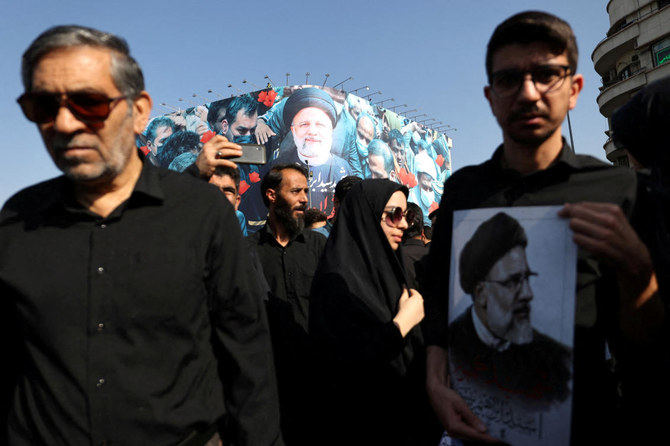
- President Ebrahim Raisi’s burial later Thursday at the Imam Reza Shrine in Mashhad caps days of processionals through much of Iran
DUBAI: Iran on Thursday prepared to inter its late president at the holiest site for Shiite Muslims in the Islamic Republic, a final sign of respect for a protégé of Iran’s supreme leader killed in a helicopter crash earlier this week.
President Ebrahim Raisi’s burial at the Imam Reza Shrine in Mashhad caps days of processionals through much of Iran, seeking to bolster the country’s theocracy after the crash killing him, the country’s foreign minister and six others.
However, the services have not drawn the same crowd as those who gathered for services for Revolutionary Guard Gen. Qassem Soleimani in 2020, slain by a US drone strike in Baghdad.
It’s a potential sign of the public’s feelings about Raisi’s presidency that saw the government harshly crack down on all dissent during protests over the 2022 death of Mahsa Amini, detained for allegedly not wearing her mandatory headscarf to authorities’ liking.
That crackdown, as well as Iran’s struggling economy, have gone unmentioned in the hours of coverage provided by state television and in newspapers. Also never discussed was Raisi’s involved in the mass execution of an estimated 5,000 dissidents at the end of the Iran-Iraq war.
Prosecutors have warned people against showing any public signs of celebrating Raisi’s death and a heavy security force presence has been seen in Tehran since the crash.
Thursday morning, thousands in black gathered along a main boulevard in the city of Birjand, Raisi’s hometown in Iran’s South Khorasan province along the Afghan border. A semitruck bore his casket down the street, with mourners reached out to touch it and tossing scarves and other items to be placed against it for a blessing. A sign on the truck read: “This is the shrine.”
Later, Raisi will be buried at the Imam Reza Shrine, where Shiite Islam’s 8th imam is buried. The region long has been associated with Shiite pilgrimmage. A hadith attributed to Islam’s Prophet Muhammad says anyone with sorrow or sin will be relieved through visiting there.
In 2016, Supreme Leader Ayatollah Khamenei appointed Raisi to run the Imam Reza charity foundation, which manages a vast conglomerate of businesses and endowments in Iran, as well as oversees the shrine. It is one of many bonyads, or charitable foundations, fueled by donations or assets seized after Iran’s 1979 Islamic Revolution.
These foundations offer no public accounting of their spending and answer only to Iran’s supreme leader. The Imam Reza charity, known as “Astan-e Quds-e Razavi” in Farsi, is believed to be one of the biggest in the country. Analysts estimate its worth at tens of billions of dollars as it owns almost half the land in Mashhad, Iran’s second-largest city.
Raisi will be the first top politician in the country to be buried at the shrine, which represents a major honor for the cleric.
The death of Raisi, Foreign Minister Hossein Amirabdollahian and six others in the crash on Sunday comes at a politically sensitive moment for Iran, both at home and abroad.
Raisi, who was 63, had been discussed as a possible successor to Iran’s supreme leader, the 85-year-old Khamenei. None of Iran’s living past presidents — other than Khamenei, who was president from 1981 until 1989 — could be seen in state television footage of Wednesday’s prayers. The authorities gave no explanation for their apparent absence.
Iran has set June 28 as the next presidential election. For now, there’s no clear favorite for the position among Iran’s political elite — particularly no one who is a Shiite cleric, like Raisi. Acting President Mohammad Mokhber, a relatively unknown first vice president until Sunday’s crash, has stepped into his role and even attended a meeting between Khamenei and Hamas leader Ismail Haniyeh on Wednesday.
Families forum release video of Israeli women troops being seized on Oct 7
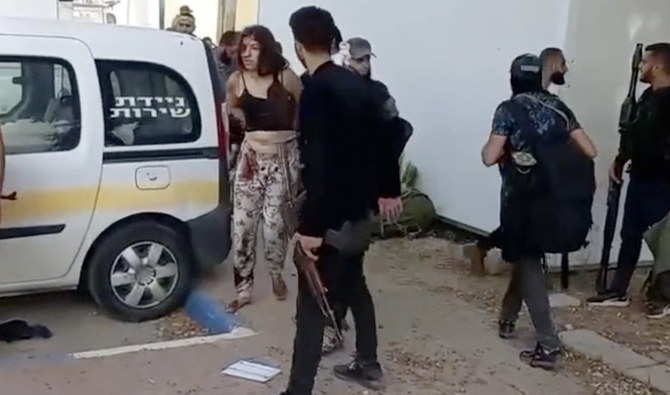
- The three-minute clip showed the women sitting on the ground, some with blood on their faces, with their hands tied
- The footage was taken from a two-hour video filmed on a body camera by Hamas militants
JERUSALEM: An Israeli campaign group on Wednesday released footage of five Israeli female soldiers being captured by Palestinian militants from a military base during Hamas’s October 7 attack, after their families gave permission.
The three-minute clip showed the women sitting on the ground, some with blood on their faces, with their hands tied following their capture from the Nahal Oz base in southern Israel.
The footage was taken from a two-hour video filmed on a body camera by Hamas militants during the attack, the campaign group the Hostage and Missing Families Forum said in a statement.
“The footage reveals the violent, humiliating, and traumatising treatment the girls endured on the day of their abduction, their eyes filled with raw terror,” the forum said as it released the footage to the media for publication.
Towards the end of the clip, the women are seen being taken away by militants in a military jeep amid screams.
“It’s time to act, otherwise the blood of my sister and other hostages will be on the hands” of the Israeli authorities, Sasha Ariev, sister of one of the seized soldiers, told AFP.
“Everyone has now seen these young girls taken captive in their pyjamas... the only victory is to bring them back quickly and alive.”
After the base was stormed by Hamas militants on October 7, more than 50 Israeli soldiers were killed in the attack, 15 of whom were women.
Seven female soldiers were taken hostage and one has since been freed in an Israeli military operation, while the body of another was found and brought to Israel.
Hamas said the video footage was “manipulated” with a selection of images aimed at supporting “false allegations” to “tarnish the image of the resistance.”
Some of the soldiers were bleeding or sustained minor injuries, “but there was no physical aggression against any of them,” the Palestinian Islamist movement said in a statement.
Hamas’s unprecedented attack on October 7 resulted in the deaths of more than 1,170 people, mostly civilians, according to an AFP tally of Israeli official figures.
Militants also took 252 hostages, 124 of whom remain in Gaza, including 37 the army says are dead.
Israeli Prime Minister Benjamin Netanyahu has come under intense pressure from the families of the hostages to negotiate the return of their loved ones from Gaza.
Netanyahu vowed in a statement on Wednesday to continue fighting Hamas to “ensure what we have seen tonight never happens again.”
Israel’s retaliatory offensive has killed at least 35,709 people in Gaza, most of them civilians, according to the Hamas-run territory’s health ministry.
The Israeli military says 287 soldiers have been killed in Gaza since the start of the ground offensive on October 27.




